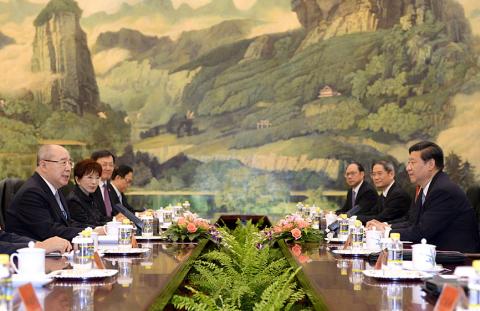|
DPP lawmakers criticize Wu-Xi meeting
By Chris Wang / Staff reporter

Former Chinese Nationalist Party
(KMT) chairman Wu Poh-hsiung, left, holds a meeting with Chinese President Xi
Jinping, right, in Beijing yesterday.
Photo: CNA
The communication platform between the
Chinese Nationalist Party (KMT) and the Chinese Communist Party (CCP) has not
been authorized by Taiwanese and it is not monitored by the legislature,
Democratic Progressive Party (DPP) lawmakers said yesterday.
The lawmakers made the remarks as a meeting between former KMT chairman Wu
Poh-hsiung (吳伯雄) and Chinese President Xi Jinping (習近平) was being held yesterday
afternoon in Beijing, the first such meeting since Xi became president.
DPP lawmakers told a press conference in Taipei that Taiwan’s sovereignty has
been eroded little by little by every KMT-CCP meeting, a mechanism that has
dictated the government’s cross-strait policy under President Ma Ying-jeou
(馬英九), while the legislature and the public can do nothing about it.
Ma must explain why he referred to the meeting as “symbolic,” DPP Legislator Lee
Chun-yi (李俊俋) said, adding that Wu also has to explain if he has been authorized
by the Mainland Affairs Council (MAC) to conduct political talks with Beijing as
stipulated in the Act Governing Relations between the People of the Taiwan Area
and the Mainland Area (臺灣地區與大陸地區人民關係條例).
More importantly, Lee said, Ma and the KMT’s haste in passing the legislation
required for the establishment of representative offices for the Straits
Exchange Foundation in China and the Association for Relations Across the Taiwan
Straits (ARATS) in Taiwan is highly suspicious, in particular after Ma
reaffirmed recently that relations between Taiwan and China are not
state-to-state relations.
The DPP would boycott the proposed amendment, Lee said.
DPP Legislator Chen Chi-mai (陳其邁) said it appeared that, after the offices have
been established, the KMT and the CCP would be inching closer to bilateral
political negotiations, which could include exchange visits of high-ranking
officials from both sides and the removal of the missiles aimed at Taiwan.
The development is a serious concern for Taiwan as potential KMT-CCP
collaboration involves a change to the “status quo,” which Ma pledged during his
presidential election campaign would require the consent of all Taiwanese, and
the lack of legislative monitoring jeopardizes Taiwan’s democratic values, Chen
said.
Chen said diplomatic immunity would not be mentioned in any bilateral agreement
because both the KMT and the CCP endorse a “one China” policy, and Beijing is
not likely to grant Taiwan the right to visit detained Taiwanese in China.
China’s Xinhua news agency reported that Xi, during his meeting with Wu, said
that both sides of the Taiwan Strait should “manage cross-strait affairs from
the vantage point of benefiting the entire Zhonghua Minzu (中華民族, “Chinese
People”); to recognize the trend of historical development and ensure the
continuation of cross-strait relations; the adherence of policy to increase
mutual trust, beneficial interaction, being practical and dealing with
agreed-upon similarities instead of focusing on differences; as well as the
maintenance of the steady progression of the general development of cross-strait
relations.”
Wu, for his part, reiterated the so-called “1992 consensus” and “opposition to
Taiwan independence” as the basis of political mutual trust.
Additional reporting by staff writer
|
![]()
![]()
![]()